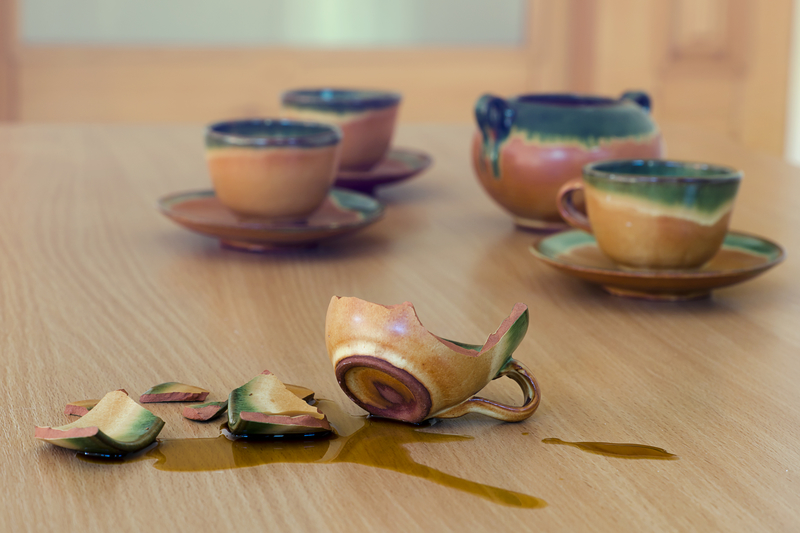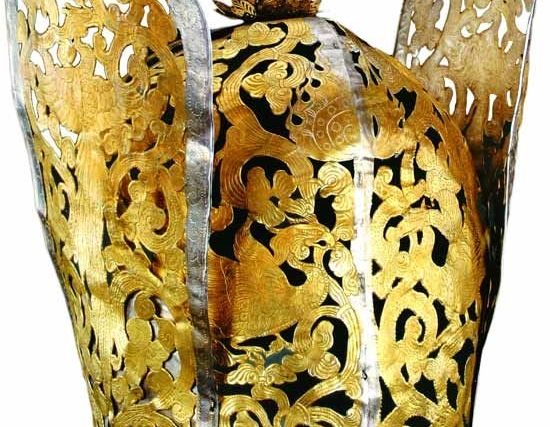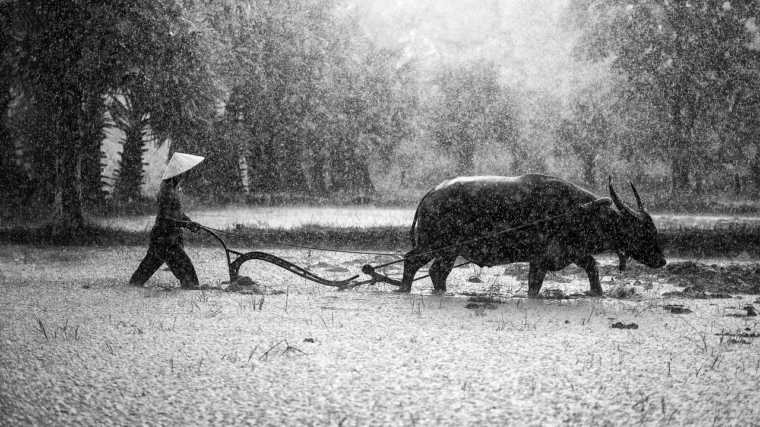Blue Cliff Record, Case 48
When Minister Wang entered Chao Ch’ing, they were making tea. At the time Elder Lang was holding the kettle for Ming Chao. Lang turned the tea kettle over.
Seeing this, the Minister asked the Elder, “What’s under the tea stove?”
Lang said, “The spirit who holds up stoves.”
The Minister said, “If it’s the spirit who holds up stoves, why then did you turn over the tea kettle?”
Lang said, “Serve as an official for a thousand days, lose it in a single morning.”
The Minister shook out his sleeves and left.
Ming Chao said, “Elder Lang, you’ve eaten Chao Ch’ing food, but still you go beyond the river to make noise gathering charred wood.”
Lang said, “What about you, Teacher?”
Ming Chao said, “The spirit got the advantage.””
Hsueh Tou said, “At the time I just would have kicked over the tea stove.”
As soon as I chose this koan to talk about his morning, I thought perhaps I’d made a mistake. I went online looking for other teachings on this case, to weigh my thinking on it against what others have had to say.
A talk by Koun Yamada, the author of the translation of the Gateless Gate we use here at Treetop, was the only one I could find, and after reading it, it became clear to me that he did so only because he was working his way through the entire Blue Cliff Record. Here’s what he had to say about this case: “This koan, to be quite frank, is neither very interesting nor much of an aid in our practice.”
I hope this ringing endorsement helps you keep your expectations for this talk in perspective.
Yamada’s esteemed opinion aside, this case appealed to me from the first time I ever encountered it, I think in part because I have always been hopelessly clumsy. Never a heavy drinker in my life, I’ve often quipped that I’m more than capable of tripping over my own feet without any assistance, thank you very much.
And while this was far from the only reason I initially took up the way of Zen, I’d be lying if I didn’t acknowledge that part of me hoped that by practicing meditation and mindfulness I might someday overcome my more oafish tendencies.
Zen ritual, at least as practiced by our Japanese counterparts, is a form of high art, demanding grace and precision. As much of the reading I did early on in my encounter with Zen made clear, the poise and elegance embodied by those first Japanese teachers was part of the appeal for some of the earliest western Zen students.
Among the flood of early American teaching stories circulating in books and online was one man’s account of deciding to practice Zen because he found himself following Zen teacher Dainin Katagiri, who was walking down the street one day in his formal robes. The man, overcome with admiration for the straightness of Katagiri’s back, followed the priest right into San Francisco Zen Center and asked for a lesson in mediation.
“I’ve been doing it ever since. It was that back,” the man told author Natalie Goldberg, who recorded the story in her book, Long Quiet Highway, an account of her own journey to practice.
Odd as that may sound, who among us doesn’t look in admiration at those whose very physicality seem to resonate calm, collected self-assurance and think, “How can I get some of that?”
And yet, when we actually begin on the path of Zen, our experience is very different from how we imagine it will be.
Eihei Dogen, the Japanese founder of our Soto tradition, famously said that, “There is a principle of the Way that we must make one mistake after another,” or, as most of you have probably heard it translated, “a Zen person’s life is one continuous mistake.”
And it’s true that Zen practice, like life, affords us a wealth of opportunities to make mistakes. Our zendo forms, while not quite as involved as in Japan, or even at many other North American practice centers, are nonetheless pregnant with opportunities to screw up. Hold your service book this way, not that way. Step off with your left foot, not your right. Hold your elbows out straight when you gassho. No leaving the line during slow kinhin. Bring your right knee down first for a full prostration.
And just when exactly are we supposed to gassho during those entering and exiting service bells, anyway?
The opportunities don’t end there. In koan practice, all of our attempts to impress the teacher with our knowledge and reason—our hunger to be the teacher’s pet—are turned brusquely aside. “Go deeper,” we’re told. Go out beyond where our footing is steady, beyond the comfort of all that we think we know. Take a risk. Make a leap. Only when we’re willing to fall flat on our faces do we find that there is no ground to meet our fall.
Even the precepts, which seem like such direct admonishments, are potential landmines lying in wait for those attached to an ideal of purity. When studied in depth, and looked at from the perspective of the Absolute, the precepts are impossible to keep. We can’t keep even one of them, and if we think we can, every step becomes a misstep.
Every breath we take extinguishes infinite galaxies of living beings. And yet, so would our deaths. We’re in a constant double bind—a Chinese finger trap—and paralysis in the face of it is not an option. Zen students do not have the luxury of withholding ourselves from the world. Rather, we must loosen up, press in and take action from a place of deep freedom from judgments of right and wrong. When we screw up, as we will, we commit to it fully.
If we expect perfection of ourselves or others, we’re setting ourselves up for endless frustration. This is why, when I’ve had the privilege of introducing newcomers to our practice here at Treetop, I’ve talked about how our forms are invitations to wake up. Whether we pay attention and do the form the correct way or we pay attention and notice that we’ve done it the wrong way, the form has done its job, offering us a foothold on reality, a place to encounter the mystery of “just this.” They are a poke in the ribs, beckoning us to wake up.
The same is true of the precepts.
Our inability to “do it right” needn’t alienate us from this path, from our lives. On the contrary, by holding both our successes and failures lightly, we can become fully intimate with it all. Sometimes we just spill the tea. That’s all.
But there’s value, too, in encountering our own resistance to failure. One of the best people I know once confided that he was reduced to tears while training to ring the service bells. His inability to keep up with all the cues triggered deeply-buried feelings of inadequacy and desperation for approval he thought he’d long since outgrown.
What a gift!
From his responses to Minster Wang, it’s clear Elder Lang knows something about those feelings, too. Not only did he spill the tea in front of an important guest, but that guest called him out for it. In the face of that, Lang’s statement, “Serve as an official for a thousand days, lose it in a single morning,” is hardly a diatribe. But it’s clear from Lang’s response that Wang’s criticism landed somewhere tender.
Lang spoke defensively because he perceived someone there to defend. But when we truly experience the Absolute, we know first-hand that there is no one there who made a mistake, we can laugh at our failings or take thoughtful account of how our actions may have affected others and make sincere amends. Either way, defensive rejoinders are of no avail.
We don’t need to deflect the blame to others—whether spirits or humans, our parents, our enemies, our superiors, our underlings, the government, or the poor. We’re able to take responsibility, look the catastrophe straight in the eye, and bear the burden of fault, because, like us, it, too, is empty. It can’t crush us.
We don’t need to invoke our mountain of accomplishments as a counterpoint to our failures, as though 1,000 days of flawless service can negate the burns and scorches caused by a single moment of inattention. That, too is futility.
In his commentary on the case, Hsueh Tou, compiler of the Blue Cliff Record says, “When Elder Lang talked this way he was like a mad dog chasing a clod of dirt.”
Take that image into your mind for a minute. Now think about the last time you felt deeply criticized. Do you resemble that remark?
I can only speak for myself, here, but in addition to my numerous other imperfections, I am, at times, a deeply defensive—deeply defended—individual. I am capable of forgiving others innumerable wrongs, save that of finding fault in me. That one transgression is enough to draw out my most mindless, bilious rage.
Sticks and stones may break our bones, but bruised egos can be the hardest to mend.
That’s why Hsueh Tou tells us he would have kicked over the tea stove. Not out of anger, but as an invitation to direct, unflinching awareness. What’s under there? Look for yourself! Is it shame, pride, inadequacy, fear, disgust? Until we look, we’ll keep on blaming others, keep on adding weight to the balance.
I think what I like best about this koan is that it shows us plainly that those of us who practice aren’t immune from this kind of foolishness. Yamada notes that Elder Lang, already senior monk at the time of this story, was one of 26 successors of master Chokei, and went on to run his own temple. Yet, not only did his years of practice fail to prevent him from turning over the tea kettle, they also didn’t cure him of his ego or his instinctual drive to protect it. Only death ultimately does that.
The novelist Catherine Aird famously said, “If you can’t be a good example, then you’ll just have to be a horrible warning.” I’m grateful to Elder Lang for serving as just such a warning, even if not a particularly horrible one.
While many of the koans we work with hinge on some turning word, some teacher saying just the right thing at just the right time to inspire an opening, such instances are only a tiny fraction of the path. Our mistakes, too, are dharma gates, if we enter them as such. Which is good news, because, speaking for myself, in terms of sheer frequency, these gates are much more abundant than the former. We must, then, take seriously the third of our Four Bodhisattva Vows: “Dharma gates ate countless; I vow to enter them.”
When Minister Wang entered Chao Ch’ing, they were making tea. At the time Elder Lang was holding the kettle for Ming Chao. Lang turned the tea kettle over.
Seeing this, the Minister asked the Elder, “What’s under the tea stove?”
Lang said, “The spirit who holds up stoves.”
The Minister said, “If it’s the spirit who holds up stoves, why then did you turn over the tea kettle?”
Lang said, “Serve as an official for a thousand days, lose it in a single morning.”
The Minister shook out his sleeves and left.
Ming Chao said, “Elder Lang, you’ve eaten Chao Ch’ing food, but still you go beyond the river to make noise gathering charred wood.”
Lang said, “What about you, Teacher?”
Ming Chao said, “The spirit got the advantage.””
Hsueh Tou said, “At the time I just would have kicked over the tea stove.”



